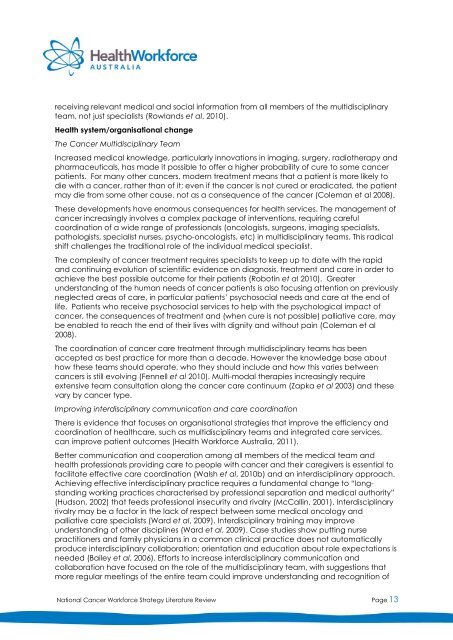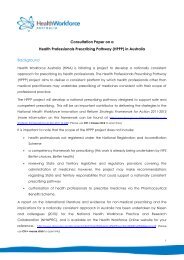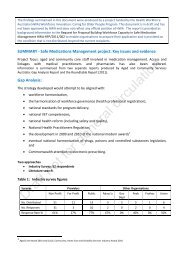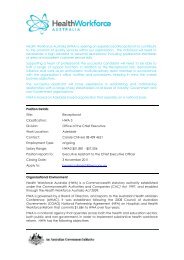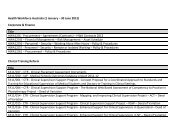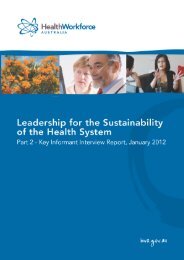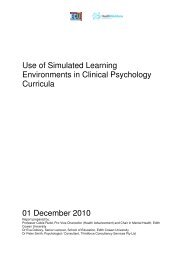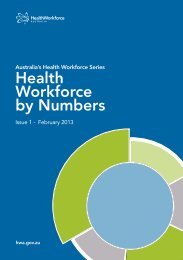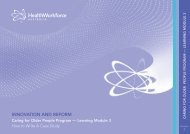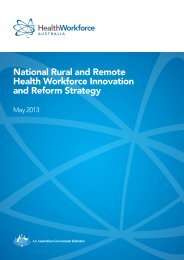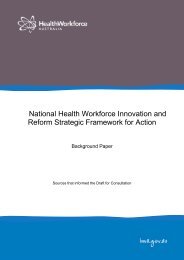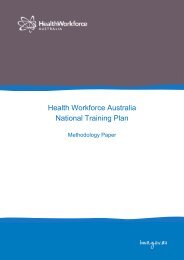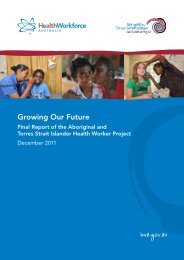eceiving relevant medical and social information from all members of the multidisciplinaryteam, not just specialists (Rowlands et al, 2010).<strong>Health</strong> system/organisational changeThe Cancer Multidisciplinary TeamIncreased medical knowledge, particularly innovations in imaging, surgery, radiotherapy andpharmaceuticals, has made it possible to offer a higher probability of cure to some cancerpatients. For many other cancers, modern treatment means that a patient is more likely todie with a cancer, rather than of it; even if the cancer is not cured or eradicated, the patientmay die from some other cause, not as a consequence of the cancer (Coleman et al 2008).These developments have enormous consequences for health services. The management ofcancer increasingly involves a complex package of interventions, requiring carefulcoordination of a wide range of professionals (oncologists, surgeons, imaging specialists,pathologists, specialist nurses, psycho-oncologists, etc) in multidisciplinary teams. This radicalshift challenges the traditional role of the individual medical specialist.The complexity of cancer treatment requires specialists to keep up to date with the rapidand continuing evolution of scientific evidence on diagnosis, treatment and care in order toachieve the best possible outcome for their patients (Robotin et al 2010). Greaterunderstanding of the human needs of cancer patients is also focusing attention on previouslyneglected areas of care, in particular patients’ psychosocial needs and care at the end oflife. Patients who receive psychosocial services to help with the psychological impact ofcancer, the consequences of treatment and (when cure is not possible) palliative care, maybe enabled to reach the end of their lives with dignity and without pain (Coleman et al2008).The coordination of cancer care treatment through multidisciplinary teams has beenaccepted as best practice for more than a decade. However the knowledge base abouthow these teams should operate, who they should include and how this varies betweencancers is still evolving (Fennell et al 2010). Multi-modal therapies increasingly requireextensive team consultation along the cancer care continuum (Zapka et al 2003) and thesevary by cancer type.Improving interdisciplinary communication and care coordinationThere is evidence that focuses on organisational strategies that improve the efficiency andcoordination of healthcare, such as multidisciplinary teams and integrated care services,can improve patient outcomes (<strong>Health</strong> <strong>Workforce</strong> <strong>Australia</strong>, 2011).Better communication and cooperation among all members of the medical team andhealth professionals providing care to people with cancer and their caregivers is essential tofacilitate effective care coordination (Walsh et al, 2010b) and an interdisciplinary approach.Achieving effective interdisciplinary practice requires a fundamental change to “longstandingworking practices characterised by professional separation and medical authority”(Hudson, 2002) that feeds professional insecurity and rivalry (McCallin, 2001). Interdisciplinaryrivalry may be a factor in the lack of respect between some medical oncology andpalliative care specialists (Ward et al, 2009). Interdisciplinary training may improveunderstanding of other disciplines (Ward et al, 2009). Case studies show putting nursepractitioners and family physicians in a common clinical practice does not automaticallyproduce interdisciplinary collaboration; orientation and education about role expectations isneeded (Bailey et al, 2006). Efforts to increase interdisciplinary communication andcollaboration have focused on the role of the multidisciplinary team, with suggestions thatmore regular meetings of the entire team could improve understanding and recognition ofNational Cancer <strong>Workforce</strong> Strategy <strong>Literature</strong> Review Page 13
professional roles, especially that of the care coordinator (Walsh et al, 2010a). However, an<strong>Australia</strong>n survey found that multidisciplinary team meetings are still dominated by medicalspecialists, with limited presence of psychologists and allied health staff such as socialworkers, physiotherapists and occupational therapists (Harrison et al, 2008). Clinicians believea multidisciplinary approach will provide better care (Zorbas et al, 2003;Harrison et al, 2008).The effectiveness of interdisciplinary practice may be hampered by inter-specialtydifferences in perspectives on evidence and willingness to use different forms of evidence inmaking treatment decisions (Broom et al, 2009). Broom and colleagues (2009) qualitativeresearch, undertaken on a small sample of oncologists and cancer nurses, highlighted atension between views of haematologists, medical oncologists and cancer nurses about thequality and thus ‘usability’ of different types of evidence, underpinning their approaches tocancer care.Studies highlight that in focusing on an interdisciplinary approach there is still the need for anidentified ‘key contact’ for each person diagnosed with cancer. Greater use of carenavigators or managers has been recommended given patients’ desire for guidance andsupport through cancer diagnosis, staging and treatment planning (Wagner et al, 2010).Patients want one person as their main contact (Walsh et al, 2010b), and it does not seem tomatter whether coordination is managed by a nurse or another team member (Thomas et al,2009). Evaluation of the cancer nurse coordinator (CNC) role in NSW found that clinicians feltCNCs had a high impact on improving patient-centred care, improving multidisciplinary careand coordinating patient access to appropriate services (Thomas et al, 2009). There isevidence that specialist nurses improve continuity and coordination of care for women withbreast cancer in <strong>Australia</strong> (Jones et al, 2010). Thomas and colleagues noted that furtherwork is needed for CNCs to effectively act as a conduit between clinicians based at thecancer service and the referring GP, and between clinicians based at the cancer careservice and other members of the cancer care team based elsewhere (Thomas ref).Like oncologists and GPs, cancer care coordinators are in limited supply and over-worked(Walsh et al, 2010a). Care coordinators in rural and regional areas who were not specialisedand thus dealt with all cancer streams felt “particularly pressured and time poor whenattempting to identify and address patients’ needs” (Walsh et al, 2010a). This wasexacerbated by a shortage of GPs, particularly in rural areas, meaning local carecoordinators often were contacted by patients with concerns that should be addressed bytheir GP (Walsh et al, 2010a). These ‘flow on’ impacts of shortages in different disciplinesproviding cancer care need to be carefully considered in workforce redesign.Increasing productivity and time for patient careOptimising health professionals’ capacity to provide quality cancer care may requirechanges to workflow, work load and work environments. Examples cited in the literature<strong>review</strong>ed include: ensuring adequate space for private consultations and administrativesupport for psychosocial staff (Rankin et al, 2011); providing clerical or other support staff todo non-nursing work enables nurses to direct more of their time and skills to direct patientcare (Barrett and Yates, 2002), and introduction of an MDT coordinator or use of otheradministrative support for multidisciplinary team meetings to reduce the burden of organisingand facilitating meetings on health professionals – often cancer care coordinators or nursespecialists – and to enable them to spend more time providing direct care to patients (Walshet al, 2010a).There is increasing evidence that ‘effective and empathetic’ communication affects cancerpatients’ outcomes, but the heavy workloads of cancer specialists may be reducing theircapacity for effective communication (Dimoska et al, 2008). Oncologists have reported thatNational Cancer <strong>Workforce</strong> Strategy <strong>Literature</strong> Review Page 14
- Page 6 and 7: o Reform health workforce roles to
- Page 11 and 12: • A lack of standards in training
- Page 14 and 15: lamed for creating confusion and hi
- Page 18 and 19: time constraints are a barrier to p
- Page 20 and 21: Emerging research shows some cancer
- Page 22 and 23: DOMAIN 2: Health workforce capacity
- Page 24 and 25: of cancer patients in the community
- Page 26 and 27: deemed necessary for medical gradua
- Page 28 and 29: Posner 2007). This person-oriented
- Page 30 and 31: network, from clinicians delivering
- Page 32 and 33: DOMAIN 4: Health workforce planning
- Page 34 and 35: Shifts in workforce demographics an
- Page 36 and 37: DOMAIN 5: Health workforce policy,
- Page 39: It is important to recognise that c
- Page 43 and 44: http://canceraustralia.gov.au/sites
- Page 45 and 46: Dorgan S, Layton D, Bloo N, Homke R
- Page 47 and 48: Hemphill JK & Coons AE (1957). Deve
- Page 49 and 50: McClelland DC (1961). The Achieving
- Page 51 and 52: Shahid S, Finn L, Bessarab D & Thom
- Page 53 and 54: Valgus JM, Aimee F, Gregory KM, San
- Page 55 and 56: Appendix A: Database search strateg


